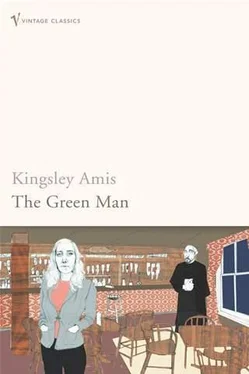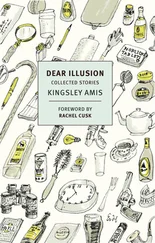I unlocked a drawer in the desk and, from under a pile of bank statements and cleared cheques, pulled out the casket containing the silver figure and the manuscript. I had been too tired to examine these the previous night, and had had no time, nor much inclination, so far that day. Now I was eager to do so. I took the figure to the window and turned it over in the strong sunlight there. Except round the neck and crotch, it was not much corroded, but other parts of it appeared to have been worn smooth. Both trunk and limbs were roughly cylindrical, with little representation of waist, elbow or knee, and the surviving hand, although disproportionately large, showed no knuckles or finger-joints. In the same fashion, the head did not taper appreciably towards the chin, the top of the skull was almost flat and the features were to a large extent matters of token; only the mouth, set in a wide straight grin that revealed a dozen or more teeth of roughly equal size, had been treated in any detail. I was certain the thing had not come from anywhere in western Europe, and felt strongly that east was the wrong direction to consider. Africa, possibly, though very unlikely, I thought, in view of Underhill’s date, if nothing else. The New World, the pre-Columbian cultures—yes: I had seen just that kind of joyful, greedy ferocity on the faces of Aztec sculptures. There would have been plenty of time—a century and a half, in fact—for such an object to make its way from conquered Mexico to the England of Underhill’s day, however hard it might be to imagine a plausible route; the capture of a Spanish treasure-ship was one obvious and not too unlikely piece of guesswork. But from whatever source and by whatever way it had reached Fareham, it was by far the most disagreeable work of human hands I have ever seen, as I had been aware the moment I looked at it closely. It was also unpleasant to the touch, being hardly less cold, or clammy, than when I had first handled it, twelve hours or so previously, and not being appreciably warmed now by several minutes’ contact with my fingers; no doubt the result of some impurity in the metal. All in all, it seemed just what Underhill would have chosen, probably from a collection of such images of man’s beastliness, to have buried with him and to serve as proof of his survival.
I put the figure down on the desk and picked up the journal, which turned out at the first glance to be written on the same kind of paper as the notebook I had inspected in the Hobson Room at All Saints’; it had perhaps lain originally between the same covers. The writing on these sheets had faded very markedly, to a kind of washed-out mid-brown, but was still quite readable. It was a thin sheaf of papers, no more than fourteen or fifteen in all, and the first dozen carried nothing but agonizingly vague injunctions to the unearther of the manuscript; stuff like
‘Bee not impacient: all things shall be deliver’d to thee in time. Put thyself under my Will, & thou shalt see a great Wonder. Prepare; abstain from all spirituous Liquors & Cordials (here at least I had already started to do my best to cooperate), takg only such Wine & small Beer as may conduce to health. Bethink thee, that altho’ Philosophy be amiable in herself, her Aspect is upon occasion full strange & stern …‘
And so on. The only entry that stood out in any way from this kind of thing, inset from the margin as though to differentiate it, to mark it perhaps as a note from Underhill to himself (a type of communication I have shown I understand) rather than a memorandum to me, ran as follows:
‘The name, Fareham village. Cf. Fareham Haven in Southhamptonshire. No knowledge of this. Quasi, far Home, sc. distant habitation, or, fair Home. Or, from the Saxon & Gothick, feor, sc. fear. So, feorhame, quasi, the Place of Fear.’
Whatever the rightness or wrongness of Underhill’s etymology, I found this making a kind of sense, the same kind as my conjecture about the derivation of the name of my house. But such theorizing belonged to an impossibly vast and remote field of thought; I put it by and went dispiritedly on through the journal. On its last leaf were half a dozen lines of writing, in a tumbling, scribbled hand barely recognizable as Underhill’s.
‘My time is nearer than I had thought. Dismiss thy Servants at once; send all from home save thine own Family. Go not abroad thyself; see no one & keep thy chamber, that I may find thee alone when I come to thee. Have our small Freind of Silver by thee AT ALL TIMES—or everything will be in vain, Now, fare well, until I shall return.’
There was only one of these instructions that it would not be difficult to obey, but that one was evidently the most important. Unhesitatingly, unreasoningly and with revulsion, I picked up the figure and placed it in my left side coat pocket, where it made an ugly bulge. That was that; what now? Preparatory to gathering the papers together, I turned the last one over and laid it on top of the others, noticing as I did so that it bore a couple of lines of writing. They were in the firm, unhurried hand of the earlier pages, and read:
‘I will wait upon thee in my Parlour at twelve of the clock, the night following thy Discovery. See thou art alone.’
What made me stare and rise to my feet and start trembling was not the content of this message, but the quality of the ink: dark blue or black, not faded at all, as if it had been put on paper that day. But how could that be?
A powerful but (again) unreasoning sense of urgency came upon me. I must find Lucy at once. I had heard her say that she was going to spend the afternoon … how? Where? Yes— reading, sunbathing, in the garden. I snatched up the paper and rushed from the office, across the hall, out of the front door and along to the south-east corner of the house. Lucy, with Nick near her, was sitting on an outdoors chair in the middle of the lawn. Slipping clumsily about on the thick dry grass, and with the silver figure bumping against my hip, I ran over to her.
‘Lucy, look at this. The ink.’
‘What is it?’
‘Look at the colour of the ink. New, fresh. Isn’t it?’
‘I don’t see—’
‘No no, the other side, that one. That’s fresh ink, isn’t it?’
She hesitated, finally saying, ‘It doesn’t look fresh to me,’ and handing the paper back.
Of course she was right. The writing on both sides was brown and faded. No amount of hurrying, presumably, would have made any difference. He had caused it to fade, or, more likely, he had caused it to look unfaded a minute ago. I noticed that Lucy was wearing a navy-blue bathing-dress with the shoulder-straps pulled down, and had a brightly-jacketed book on her lap, and was looking slightly dazed with sun. Nick took the paper from me, glanced at it, then started to read it. He was just wearing trunks and sandals.
‘No, it doesn’t,’ I said, ‘now I look at it again. I don’t know what made me … It must have been the light. It’s not very good in the office. The light. Unless you have the light on.’
‘What’s all this about, Dad?’ asked Nick.
‘Well, it’s … part of a letter or something, I suppose. I found it.’
‘Where?’
‘Oh, I was turning out an old cupboard and this had got sort of shoved underneath a lot of stuff.’
‘How could it have been written in fresh ink, then?’
‘I don’t know. I just thought it looked like that.’
‘What does it mean, this friend of silver thing, and this discovery?’
‘I don’t know. I’ve no idea.’
‘Well, why all the excitement? You were—’
‘It doesn’t matter.’
A car I recognized was turning in at the main entrance to the house, a green Mini-Cooper belonging to the Mayburys. For a moment I thought I was going to have Jack on my hands, with more pills and unwelcome advice; then I saw Diana in the driving-seat, and remembered.
Читать дальше











